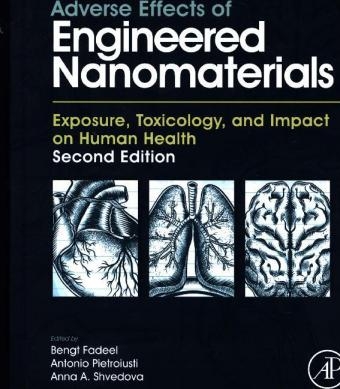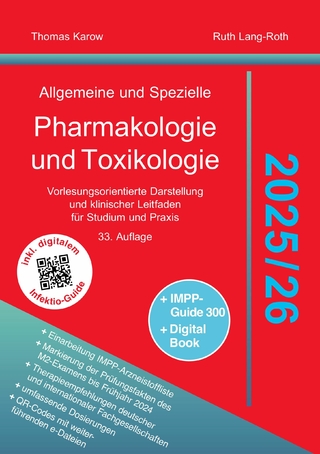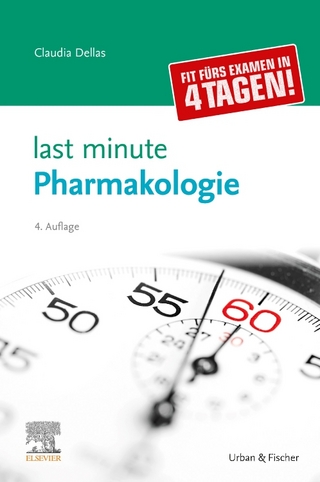
Adverse Effects of Engineered Nanomaterials
Academic Press Inc (Verlag)
978-0-12-809199-9 (ISBN)
Written by leading international experts in nanotoxicology and nanomedicine, this book gives a comprehensive view of the health impact of ENM, focusing on their potential adverse effects in exposed workers, consumers, and patients. All chapters have been updated with new sections on the endocrine system and other organ systems. In addition, other newly added sections include introductory chapters on the physio-chemical characterization of nanomaterials and interactions between nanomaterials and biological systems, as well as a new chapter that explores risk assessment and management of nanomaterials.
This book fills an important need in terms of bridging the gap between experimental findings and human exposure to ENM, also detailing the clinical and pathological consequences of such exposure in the human population.
BENGT FADEEL is Professor of Medical Inflammation Research at the Institute of Environmental Medicine, Karolinska Institutet, Stockholm, Sweden, and Adjunct Professor of Environmental and Occupational Health, University of Pittsburgh, Pittsburgh, PA. He served as Vice Chairman of the Institute of Environmental Medicine from 2009-2013. He received his M.D. and Ph.D. degrees from Karolinska Institutet and was elected as a Fellow of the Academy of Toxicological Sciences in 2012. He is a current or past member or coordinator of several EU-funded projects on nanosafety, including NANOMMUNE, MARINA, NANOREG, SUN, and NANOSOLUTIONS, and member of the EU-funded GRAPHENE Flagship Project, and of the national MISTRA Environmental Nanosafety consortium. Dr. Fadeel is also Chair of the Working Group on Systems Biology in the EU Nanosafety Cluster and a member of the WHO-IPCS Working Group on principles and methods to assess the immunotoxicity of nanomaterials. He is Chair of the Scientific Panel of the National Platform for Nanosafety in Sweden. He is author or co-author of more than 200 original papers and review articles to date. Dr. Fadeel was awarded the national Environmental Medicine Prize by the Cancer and Allergy Foundation in 2011 for his research on the opportunities and risks of the emerging nanotechnologies. ANTONIO PIETROIUSTI received his habilitation as Associate Professor in Occupational Medicine from the Italian Ministry of Education, University and Research in 2013 and he teaches Occupational Medicine at the Faculty of Medicine and Surgery of the University of Rome Tor Vergata (English course). He is also professor of Occupational Medicine at the University “Nostra Signora del Buon Consiglio of Tirana, Albania. He is/has been member or coordinator of several national projects funded by the Italian Ministry of Health and by the Italian Ministry of Education, University and Research. He is/has been member of two Seventh Framework Program projects on nanosafety including FP7-MARINA and member of one Seventh Framework Program project on the EU/LAC cooperation. He is Editor of the newsletter of the Toxicology Group of the Royal Chemical Society (UK), and served as co-editor of the special issue on Nanotoxicology published by the journal Toxicology and Applied Pharmacology in 2016. He was awarded by the Italian Society of Occupational Medicine in 2012 for his scientific activity in Occupational Medicine. He is author or co-author of 120 scientific articles. ANNA A. SHVEDOVA is Lead Research Physiologist at National Institute for Occupational Safety and Health (NIOSH) at the Center for Disease Control and Prevention (CDC) and Adjunct Professor of the Department of Physiology and Pharmacology, School of Medicine and Adjunct Professor of the Department of Pharmaceutical Sciences, School of Pharmacy of West Virginia University, WV. Dr. Shvedova received her Ph.D. and D.Sc. degrees from Moscow University, Russia and is currently Principal Investigator of a number of NORA/National Occupational Research Agenda and NTRC/Nanotechnology Research Center projects at the Exposure Assessment Branch/NIOSH/CDC. Dr. Shvedova was founder and first President of the Dermal Toxicology Specialty Section of the Society of Toxicology (SOT). She is member of advisory board committees for US Army, Air Force and NASA projects and served as workpackage leader in the FP7-NANOMMUNE project (2008-2011), and she is a partner of the FP7-NANOSOLUTIONS project (2011-2017) and member of the ethical board review of the Graphene Flagship Project of the European Commission (2016-2020). Dr. Shvedova has been honored with the SOT Public Communication Award in 2001; Alice Hamilton NIOSH Award for paper of the year in Occupational Safety and Health in 2006, 2009; Bullard-Sherwood Award: Research for Practice in 2011, and Women in Toxicology SOT Award in 2007. Dr. Shvedova is board member of the working group on Skin Notation at NIOSH/CDC, Associate Editor of Toxicology & Applied Pharmacology, and Editorial Board Member of Regulatory Toxicology & Pharmacology. Dr. Shvedova is author or co-author of more than 160 scientific articles and book chapters.
Section A: Engineered nanomaterials: Hazard, exposure, risk assessment 1. Bio–Nano Interactions 2. Physicochemical Characterization 3. Toxicity Tests: In Vitro and In Vivo 4. Computational Approaches 5. Exposure Assessment 6. Biomonitoring 7. Regulation and Legislation 8. Risk Assessment and Risk Management
Section B: Engineered nanomaterials: Adverse effects on human health 9. Respiratory System, Part One: Basic Mechanisms 10. Respiratory System, Part Two: Allergy and Asthma 11. Cardiovascular System 12. Neurological System 13. Immune System 14. Endocrine System 15. Skin 16. Gastrointestinal System 17. Reproduction and Development 18. Genotoxicity and Cancer
| Erscheinungsdatum | 09.03.2017 |
|---|---|
| Verlagsort | San Diego |
| Sprache | englisch |
| Maße | 191 x 235 mm |
| Gewicht | 1160 g |
| Themenwelt | Medizin / Pharmazie ► Physiotherapie / Ergotherapie ► Orthopädie |
| Studium ► 2. Studienabschnitt (Klinik) ► Pharmakologie / Toxikologie | |
| Studium ► Querschnittsbereiche ► Klinische Umweltmedizin | |
| Technik ► Maschinenbau | |
| Technik ► Medizintechnik | |
| ISBN-10 | 0-12-809199-1 / 0128091991 |
| ISBN-13 | 978-0-12-809199-9 / 9780128091999 |
| Zustand | Neuware |
| Informationen gemäß Produktsicherheitsverordnung (GPSR) | |
| Haben Sie eine Frage zum Produkt? |
aus dem Bereich


